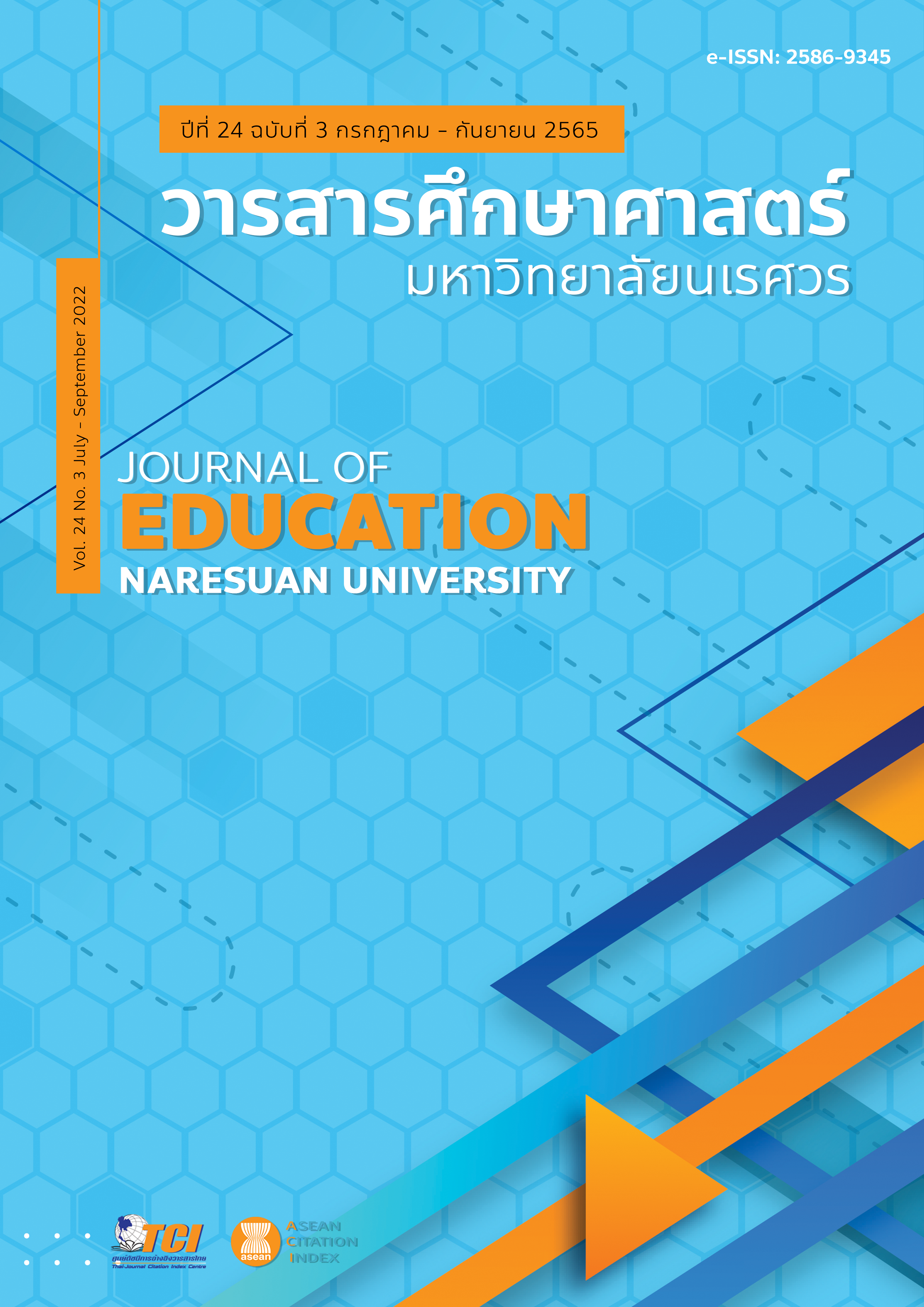DEVELOPING NINTH GRADERS’ COMPLEX PROBLEM SOLVING COMPETENCY VIA ENGINEERING DESIGN PROBLEM-BASED LEARNING การพัฒนาสมรรถนะการแก้ปัญหาที่ซับซ้อนของนักเรียนชั้นมัธยมศึกษาปีที่ 3 ผ่านการจัดการเรียนรู้การออกแบบเชิงวิศวกรรมโดยใช้ปัญหาเป็นฐาน
Main Article Content
Abstract
Complex problem solving is a competency necessary for taking any careers in the 21st century world. The goal of this study was to enhance a class of grade 9 students’ Complex problem solving competency by using an engineering design problem-based learning. The participants were 38 ninth graders of a laboratory school located in Bangkok. A set of complex problem solving test was used for tracking the students’ complex problem solving development. Each test consisted of one problem scenario and seven open-ended questions in relation to the 7 components of the complex problem solving. Findings from content analysis reveal that the majority of students arrive at the high competency level after experiencing three cycles of teaching through the engineering design problem-based learning. Top three components of complex problem solving with which the students present high development are: 1) identify problem, 2) evaluate the complexity of the problem, and 3) identify the relationship among variables related to the problem, respectively. However, the component by which many students struggle with is to evaluate the appropriateness of the solution. This study provides suggestions for teachers on how to create learning activities that promote children’s development of complex problem solving.
Article Details

This work is licensed under a Creative Commons Attribution-NonCommercial-NoDerivatives 4.0 International License.
The owner of the article does not copy or violate any of its copyright. If any copyright infringement occurs or prosecution, in any case, the Editorial Board is not involved in all the rights to the owner of the article to be performed.
References
Chimkul, A., Kaewdee, S., & Nipada R. D. (2017). Effects of biology learning management based on the stem education approach on problem-solving ability and biology learning achievement of upper secondary school students. An Online Journal of Education, 12(1), 324-342. [in Thai].
Cholsin, J., Kijkuakul, S., & Chaiyasith, W. C. (2018). The action research for developing learning management on stoichiometry based on STEM approach emphasized engineering design process to promote collaborative problem solving competency. Journal of Education Naresuan University, 20(2), 32-46. [in Thai]
Fischer, A., & Neubert, J. C. (2015). The multiple faces of complex problems: A model of problem solving competency and its implications for training and assessment. Journal of Dynamic Decision Making, 1(6), 1–14.
Funke, J. (2012). Complex problem solving. In N. M. Seel (Ed.), Encyclopedia of the Sciences of Learning (pp. 682-685). Heidelberg: Springer. Retrieved from https://ssrn.com/abstract=2233373
Grubbs, M., & Strimel, G. (2015). Engineering design: The great integrator. Journal of STEM Teacher Education, 50(1), 77-90.
Hatraw, K., Thammaprateep, J., & Chawakirtipoon, N. (2017). The effects of problem-based learning in the topic of environment on problem solving skills and analytical thinking skills of Mathayom Suksa VI Students in Phuket Province. TNI Journal of Business Administration and Languages, 5(2), 46-51. [in Thai].
Kamtha, Y. (2014). The development of seventh grade students’ conceptions of atmosphere and applications in everyday daily life through context-based learning (Master thesis). Bangkok: Kasetsart University. [in Thai]
Kemmis, S., McTaggart, R., & Nixon, R. (2014). The action research planner: Doing critical participatory action research. Singapore: Springer.
Lin, H. S., & Chiu, H. L. (2004). Student understanding of the nature of science and their problem-solving strategies. International Journal of Science Education, 26(1), 101-112.
National STEM Education Center. (2015). STEM education network manual. Bangkok: IPST. [in Thai]
OECD. (2013). PISA 2012 Assessment and analytical framework mathematics, reading, science, problem solving and financial literacy. Paris: OECD Publishing.
Peerawong, J. (2010). Development of learning plans to practice science problem solving process skills of Prathom Suksa 6 students (Master thesis). Chiangmai: Chiangmai University. [in Thai]
PISA Thailand. (2018). PISA 2015 results: Science, reading and mathematics, excellence and equality in education. Bangkok: Success Publication. [in Thai]
Sangthong, W. (2010). Grade 7 students’ views on science, technology and society, conceptions of matter and applications in everyday life using science, technology and society approach (Master thesis). Bangkok: Kasetsart University. [in Thai]


